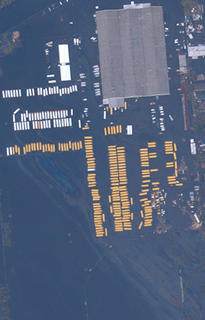The federal government doesn't have the first responsibility in disaster response. The local government and the state are the "first string." The federal government is supposed to come in later. The feds role is to provide backup resources - backup. The locals and state are supposed to provide the initial resources, then the feds come later.
No, this does not fit the "blame Bush for everything" meme.
The City of New Orleans had a great plan for a major hurricane.
This is the Google cache of it. But they didn't follow it. For example, the plan says to stock the Superdome with food and water for something link 10,000 people for 3 days. But they didn't stock anything at all. Do you blame Bush for that?
News Snipet Blog covers the plan.
Police
Our Constitution
prevents the federal government from policing our civilian population. This is because of fear of misuse of the power by the president resulting in a police state. So, of course, it is the local government that provides the police - during normal times and during disasters. The locals know their area and are known by the population, so they are the best source of police.
During a disaster the governor of the state has control of the national guard and can use them for policing. Only as a desperate last resort are federal troops used.
Hugh Hewitt is a law professor and
he covers the legal basics. Skip past his coverage of the ridiculous claim that Condoleeza Rice is to blame.
For starters, the police power resides in the states. There is no general federal police power. It is the power to take care of a citizenry's health, safety and morals. It was described by Chief Justice Taney in the Licensee Cases this way:
But what are the police powers of a State? They are nothing more or less than the powers of government inherent in every sovereignty to the extent of its dominion. And whether a state passes a quarantine law, as a law to punish offenses, as to establish courts of justice, or requiring certain instruments to be recorded, as to regulate commerce within its own limits, in every case it exercises the same power; that is to say, the power of sovereignty, the power to govern men and things within the limits of its dominion.
"To the extent of its dominion," is the key phrase. For the federal government to act in the face of a natural disaster, it's help must be requested and its guidance accepted by the state and local officials.
Locals
Mayor Nagin and Governor Blanco made major errors. The federal FEMA made some and they should be held accountable. Director Brown did poorly and should be replaced.
Levees - Does reduced funding for the Army Corps of Engineers explain the failures of the two
levees? No. First, the levess that failed had been rebuilt and were in good shape,
says the Army Corps of Engineers.
Second, A New Orleans levee board
was being investigated for corruption before Katrina:
Rampant public corruption was doing big business in New Orleans long before Hurricane Katrina ever hit. What then Congressman, now Senator David Vitter calls "corrupt, good old boy" practices were apparent in the New Orleans Levee Board just one year before the collapse of regional levees, emergency communications and government services brought the Big Easy to the brink of anarchy. In fact, Senator David
Vitter requested a federal investigation into improper practices of a number of public utilities, including the New Orleans Levee Board, and anew Task Force was to have been initiated in the Baton Rouge office, beginning in July 2004.

Buses - There has been a lot of coverage and an aerial photo of the 255 school buses that are still sitting in flood water; they were not used to evacuate people. If they were crammed with 55 people in each, then 14,025 could have been evacuated. Photo - You can't blame Bush for the mayor not using them.
Resource - Rich Moran has built a
timeline of the events in the Katrina response.
 Buses - There has been a lot of coverage and an aerial photo of the 255 school buses that are still sitting in flood water; they were not used to evacuate people. If they were crammed with 55 people in each, then 14,025 could have been evacuated. Photo - You can't blame Bush for the mayor not using them.
Resource - Rich Moran has built a timeline of the events in the Katrina response.
Buses - There has been a lot of coverage and an aerial photo of the 255 school buses that are still sitting in flood water; they were not used to evacuate people. If they were crammed with 55 people in each, then 14,025 could have been evacuated. Photo - You can't blame Bush for the mayor not using them.
Resource - Rich Moran has built a timeline of the events in the Katrina response.

No comments:
Post a Comment